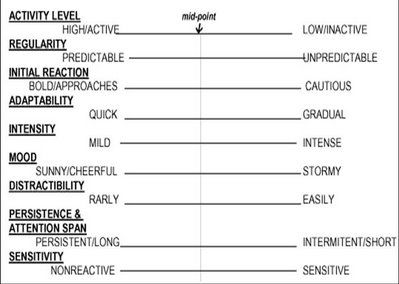TEMPERAMENT
A large part of my career was spent applying the discoveries of Skinner et al in behavior science to the world of corporate training. My boss was an “almost radical behaviorist.” Behaviorists ascribe all non-random responses to operant conditioning.
Behaviorists argue that little if anything is innate, and almost all responses are learned. There are obviously responses that are involuntary, such as breathing. It’s impossible to “hold my breath until I die.” Irises widen and narrow per lighting changes without our even thinking about it.
The two interactive responses which behaviorists admit to be innate are suckling and grasping. These responses would be considered “hard-wired.”
In my lifetime much progress has been made sorting out nature and nurture, or hard-wired versus learned. Much schizophrenia has been reclassified from a religious, or moral, or psychological condition, to one of neurochemistry.
Most schizophrenics don’t need exorcism or talk therapy, they just need to take their pills.
Non-behaviorists have investigated the perceived phenomena of innate personality traits. Through TV reports and general discussion I’ve been aware of this field of thought for some time, but for this blogpost I’m relying on Wikipedia and the other sites linked.
These psychologists have identified nine traits which they believe to be innate, or hard-wired, as in the following chart.

Other psychologists have grouped these nine traits (hard for anyone to remember them all) into three general types. A fourth type, which includes a third of the population, is “Other” or “mixed."
If this is true, it comes as a relief.
Our perceptions are correct, there actually are such things as “difficult” and “easy” babies.
The hard-wiredness of temperament removes responsibility from both parent and child.
A child isn’t difficult because of some shortcoming of the parents. And the child isn’t being “bad.” The child is difficult simply because some children are difficult. And, supposedly, there’s help available for raising difficult children.
The fact that smart people are looking into ways to help parents and their children to interact happily gives me a good feeling. Child development professionals tend to be tres sympatique at least as compared to, say, dieticians (sorry but it’s true). This guy for instance.
This website belongs to a shrink specializing in adoptive family relationships, who himself had a “difficult” child.
A nuclear physicist I worked for briefly, who was himself undistinguished in appearance, had pictures on his office walls of a beautiful wife and two good looking boy’s. When I complimented him on the photos he said matter of factly, “Yeah, the younger boy had some developmental issues, but now he’s ok.”
Lucky kid.
I see no reason why the hard-wiredness of temperament can’t eventually be modified medically, as we do with the hard-wiredness of schizophrenia.
Innate response styles must be caused by neurochemicals. While the field is in it’s infancy, we can expect neurochemistry to eliminate eventually the “difficult” child.
My friend says this is Brave New World.
----- o -----
No comments:
Post a Comment